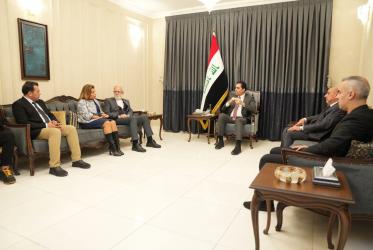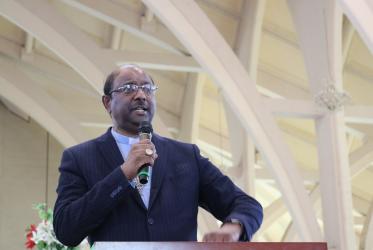Asia
Dr Mathews George Chunakara, general secretary of the Christian Conference of Asia, opened the floor for representatives of different Asian countries to speak to the concerns from their contexts. From massive flooding over half of Pakistan to the complexity of the situation in Myanmar, speakers noted that regional concerns are global concerns as well.
Gender equality and overcoming gender-based violence, and the importance of youth involvement and leadership were also highlighted by a number of speakers.
For all the concerns, as one speaker noted, “We have to speak up and empower each other together.”
Africa
“How can the Africa experience contribute to the development and formation of global Christianity?” In discussing this question, the gathering acknowledged that the church in Africa needs to claim its space in the ecumenical movement and let the African experience influence the global Christian agenda.
“We are blessed in Africa. We have the human resources. We have proved this through the work that the current WCC moderator has done,” said Rt Rev. Arnold Temple of Methodist Church Sierra Leone and president of the All Africa Conference of Churches.
Caribbean
The meeting of participants from Jamaica, Trinidad and Tobago, Guyana, Cuba and other Caribbean countries was reminiscent of a family reunion, with the sharing of chocolate and exchange of laughter and a light-hearted tone throughout. Though there are real concerns regarding climate change, political unrest and infrastructure inefficiencies, attendees were hopeful and determined to work towards solutions. Three subcommittees were formed to explore and organize thoughts around the top issues mentioned including Haiti, reparations, and Cuba.
Europe
European churches discussed European Union’s role for peace in Ukraine, WCC’s role in dialogue, climate justice, racism, populism, evangelism, and participation of youth, women, indigenous peoples, gender and sexual minorities, and people with disabilities. They expressed their wish for the WCC Assembly to address these issues especially in its final message.
“European churches are alive and kicking. They are responding to the challenges emerging in the region,” stated the general secretary of the Conference of European Churches Dr Jørgen Skov Sørensen, stated. He added, “We have brought to the WCC Assembly concerns of European churches, especially their aspirations for peace, reconciliation and unity.”
Latin America
Nearly 100 Latin American participants discussed the situation in their respective countries and how to bring them to the attention of the assembly and the World Council of Churches.
A “working paper”, intended to provide a platform for WCC engagement in the region in the coming years, underscores violence, peacebuilding processes, environmental crisis, indigenous rights, racism and xenophobia, migration, religious fundamentalism as critical issues.
Middle East
More than 50 people met to discuss the challenges facing Middle Eastern churches and how best to address those issues together.
Dr Michel E. Abs, general secretary of the Middle East Council of Churches, noted that many of the same problems and tragedies identified 100 years ago in the King-Crane report on the implementation of the Treaty of Versailles still apply today. Over the decades, Abs reflected, regional unity has been destructured, creating islands of “minorities” isolated from one another. Much positive work, in a spirit of reunification, has been undertaken in the creation of Christian agencies, schools and hospitals.
North America
The North America regional meeting was attended by about 175 people from Canada and the United States of America. In examining the key issues for the region, the participants engaged in a prioritization exercise on Mentimeter, having each country separately choose what they thought were the most important issues. Combining the list, the highlighted priorities included racism, climate justice, reconciliation with Indigenous Peoples and economic inequality.
The discussion was rich and varied throughout the meeting, demonstrating the clear value in ecumenical work within the North American context, and showing the commitment of the many confessions to face together the key challenges in Canada and the United States.
Pacific
The Pacific Islanders shared a kava ceremony in their Informal gathering of about 50 people. Young people – including performers and stewards – made up about half the group, and it was a time for young people to meet church leaders from the different countries, including West Papua, Australia and Aotearoa-New Zealand.
The opportunity to share and amplify Pacific concerns through performance was lifted up – concerns for climate change, self-determination and decolonisation, addressing the nuclear legacy, and gender justice, including overcoming violence against women, girls and children.
Livestream of the WCC 11th Assembly in Karlsruhe, Germany






